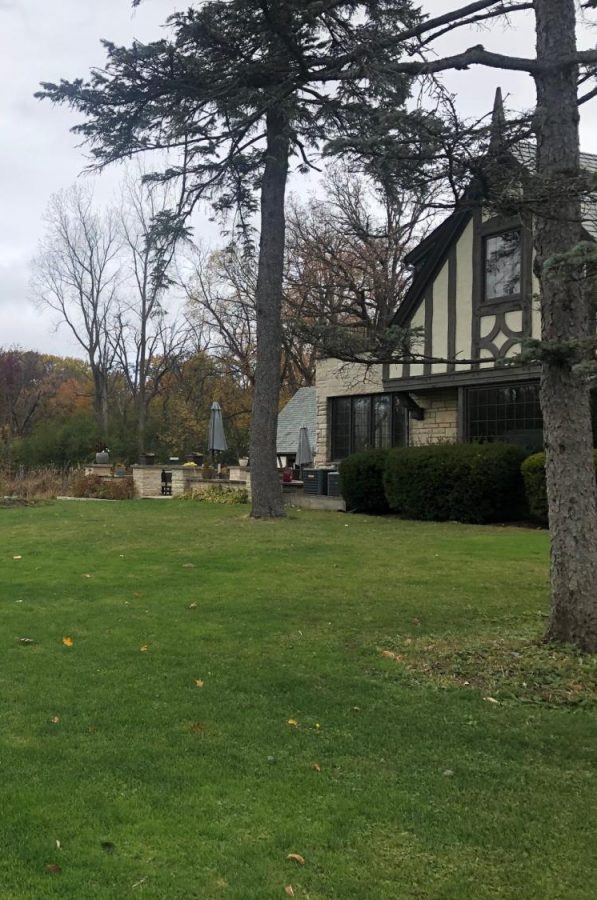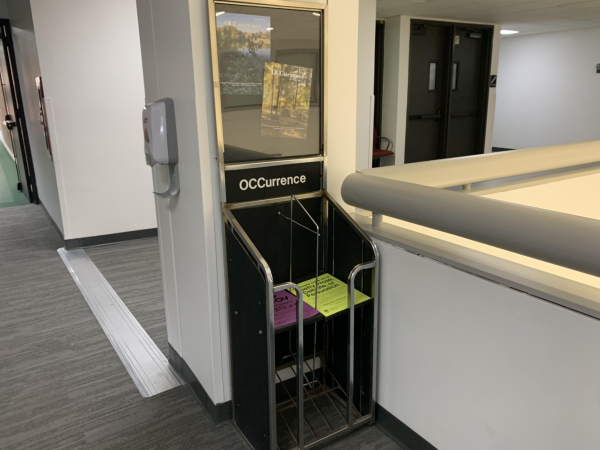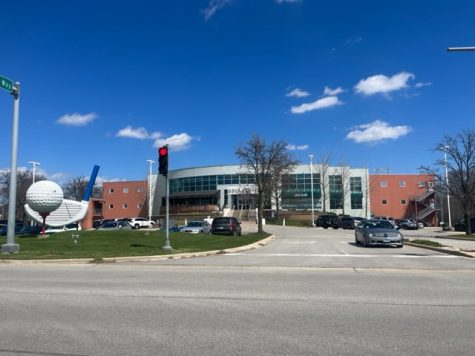Area resident creates recovery community in Northbrook
November 1, 2020
“Say more about that.” These are words frequently heard coming from Stephanie Zwilling, LCSW, spoken to ten or eleven groggy young men (some Oakton students) as morning sunlight starts filtering into a spacious living room during group therapy at the Providence Farm house in Northbrook.
Each of them (ages 18-30) earned their places on the chairs and couches by completing some form of inpatient treatment for a substance abuse disorder, and have realized that their long and difficult journeys along the path to recovery have only just begun.
Looking out the windows of the living room and past the spacious patio, people can see nearly two and a half acres of open lawns, complete with a pond, a barn housing goats and pigs, a chicken coup, and a vegetable garden.
On one side of the property is the quiet suburban neighborhood, and on the other is the Sunset Ridge Woods forest preserve. The house itself is a refurbished old home with many bedrooms, bathrooms, a large kitchen, and numerous communal spaces for dining and recreational activities.
In the years leading up to 2017, when the sober home was established Stephanie Zwilling felt that the place was ideally suited for young men battling addiction.
“I would drive past this house and would be like ‘that would be the house.’”
For Zwilling, “the house” meant a place that young men from the Chicago area could build the best recovery environments close to home.
After being a therapist in wilderness programs, Zwilling started her private practice in the Chicago area, working with young people struggling with substance use disorders.
As typical in her line of work, many of her clients would go off to wilderness programs or other primary treatment programs, from which they would then be sent to aftercare programs in a variety of places with easy access to idyllic natural settings.
“I had all these kids that were going to wilderness or primary treatment programs, and then going to programs kind of like Providence for aftercare in Maine, Oregon, Arizona, Utah, wherever.”
Very few of these programs are located in the Midwest, and even fewer are located in or around the Chicago area. “It never made sense to me…I was getting those kids who six months or a year later were transitioning home from their aftercare program, and then they’d have to recreate their recovery infrastructure all over again.”
Zwilling recalls being bothered by the lack of sober living communities nearer to the homes of her clients. “Look, if these kids are coming home, they should be getting to build their recovery communities here.”
But Zwilling did not imagine that she would be the one to establish that space.
“I always thought that, but never had any intention of doing anything about it myself. I just railed against it for a really long time.”
However, her reluctance to do something herself did not last, and events in the community and in her own practice ultimately pushed to make the first move.
“There were a couple crises in our community. Namely there were these four boys on a canoe in New Trier, they were drinking and under the influence of other drugs, and they all drowned and died. A lot of substance related overdoses. I lost a client right before the founding of Providence Farm.”
It was this sense of urgency that really propelled Zwilling’s idea into a reality.
“It just sort of became this ball that got rolling, that I couldn’t stop even if I wanted to.”
The founding of Providence Farm, for Zwilling, was unstoppable. However, the community of Northbrook definitely pushed back against it. The pushback was so great that Zwilling felt the idea Providence Farm might never come to fruition.
“There were hundreds of people pouring out of the village hall, protesting. People said the stupidest stuff. There were three legal injunctions at the eleventh hour to block us. There was somebody who came in and tried to buy the house, cash offer, after we got through zoning to get it away from us. It’s literally a little bit miraculous that we’re here.”
For Zwilling, these struggles and barriers that surrounded the founding of Providence Farm speak volumes to society’s perception of addiction. “People who have a substance use disorder are like the pariahs of the community and usually that’s just so misguided and warped.”
“They have this idea in their head of what an addict looks like, and it’s so ugly… That they’re violent criminals; that they’re immoral, bad people; that recovery is impossible; that sort of imagery of the hopeless alcoholic or addict.”
Zwilling sees a certain degree of misunderstanding towards addicts and alcoholics in the general public. However, she challenges what she believes to be skewed perceptions, and pushes for greater empathy from the community.
“I don’t think people realize the foe of addiction; how powerful a foe that is, and how much strength it takes, and work–sustained work–it takes to recover. I just have always felt like anybody who walks through these doors and meets our guys–and it has happened over and over again–says ‘These are the most lovely human beings, and of course they deserve our love, attention, and effort.’”
Zwilling knows that her battle against addiction is hard fought and fraught with challenges. “I tell the staff that every day we put on our suit of armor and go to war with the disease of addiction. You know, the denial, the self-deception, the depression, the kinda distorted thinking, the criminality, or the authority reaction.”
Despite the magnitude and multitude of forces that stand in the way of recovery from addiction, Zwilling sees this battle as one well worth fighting. Furthermore, she believes that society could gain a lot from learning to see the addicts and the disease of addiction in a different light.
“Who people are in their using days, versus who they are in their sober days or in their recovery are so different. I think the more you understand that, the more you consider the implications of mental health and addiction on a society, and how they show up in society, and what’s possible for them, and what they bring–both positive and negative–to society.”










